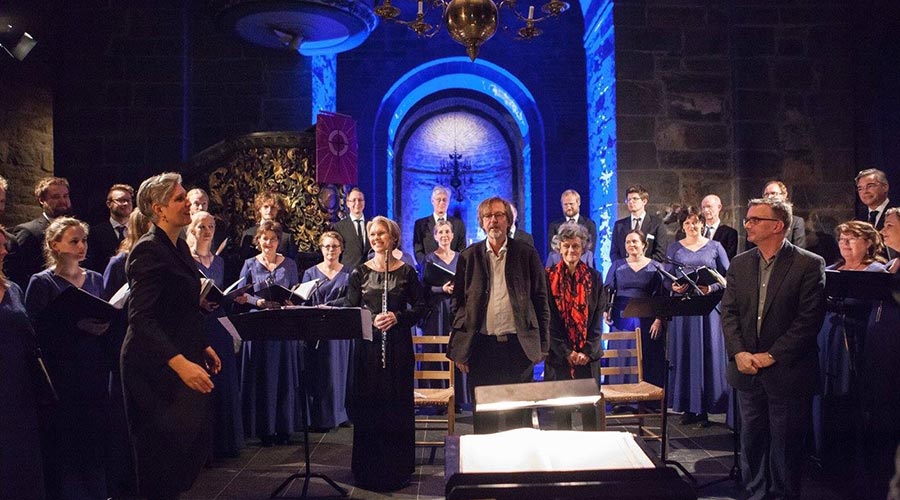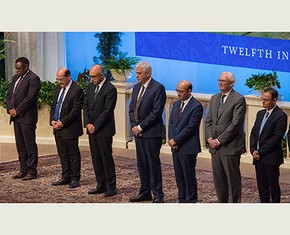At a recent major international music festival, one composition stood out in particular for its portrayal of faith and spiritual transformation under great oppression.
Well-known Norwegian composer Lasse Thoresen was inspired by the poetry of Mahvash Sabet, a Baha’i imprisoned in Iran for her faith. His musical composition, “Prison Poems,” shares the title of the volume of Mrs. Sabet’s poetry, adapted into English from Persian.

The premier of the musical composition Prison Poems coincided with the release of a Norwegian translation of Mahvash Sabet’s book of poetry, upon which his work is based (Lasse Thoresen in middle).
For Mr. Thoresen, what inspired him most about the poems is the story of transformation brought about through suffering and the potential of the human spirit to transcend external conditions and meet hatred with love.
“Mahvash Sabet has been held in prison under terrible conditions for nearly ten years. She has endured torture and abuse,” Mr. Thoresen said. “We often think of those who are subjected to such treatment as victims. But there is nothing in Mahvash Sabet’s poetry indicating that she sees herself as a victim.”
“We are dealing with spiritual resources that first unfold in critical situations,” he continued. “We get to follow Mahvash Sabet on her journey into the darkness and suffering of prison, through the shattering of her identity, and finally to her ascent into a state of luminous love.”
Mrs. Sabet was arrested in 2008 and jailed along with the six other members of the Yaran, an informal council of seven Baha’i individuals in Iran responsible for managing the affairs of the Iranian Baha’i community. After 1983 when the government had dissolved the national and local Baha’i administration, the Baha’i community established this informal arrangement with the full knowledge of the authorities.

Mahvash Sabet
Mrs. Sabet and the other six members of the Yaran were held without charge for over a year and a half. Before their trial began in early 2010, they had received only about one hour’s access to their legal counsel and had undergone appalling treatment in prison. After a trial characterized by lack of due legal process, they were convicted and sentenced to 20 years in prison for, among other things, espionage, propaganda against the regime, and spreading corruption on earth.
When that initial sentence was met with international condemnation, the appeals court revoked three of the charges against them and reduced their sentences to ten year terms. However, the prisoners were informed in 2011 that their original 20-year sentences had been reinstated. Despite repeated requests, neither the prisoners nor their attorneys have ever received official copies of the original verdict or the ruling on appeal.
Throughout the course of her unjust incarceration, Mrs. Sabet, an educator by profession, has been writing poetry. The quality and volume of the poems she has produced is an astonishing feat considering the harsh conditions of her imprisonment. Journalist Roxana Saberi, who shared a cell in Evin prison with Mrs. Sabet and Fariba Kamalabadi, another member of the Yaran, has previously described the cell they were kept in, a room four by five meters in size with no beds or pillows. A piece written for the Washington Post recalls that the two women were permitted one pen between them, which they highly cherished:
Every word of thy poetry is indeed like unto a mirror in which the evidences of the devotion and love thou cherishest for God and His chosen ones are reflected. Well is it with thee who hast quaffed the choice wine of utterance and partaken of the soft flowing stream of true knowledge. – Baha’u’llah, Tablets of Baha’u’llah, pp. 175-176.
On the fifth anniversary of Mrs. Sabet’s imprisonment, a collection of her poetry was adapted into English and published. The volume, “Prison Poems,” has attracted widespread acclaim both for the literary quality of the poems and its moving portrayal of the sufferings of Iran’s Baha’is and Mrs. Sabet’s fellow prisoners in Iran’s notorious Evin and Raja’i Shahr prisons.
For Mr. Thoresen, the intensity of the poetry was such that he did not want to put the words themselves to music, but rather to create a “sound scenography” around the poems. “I didn’t want to have the texts sung,” he explained. “They are too naked, too pared down. They are so authentic that I didn’t want to embellish them.”

Flutist Maiken Mathisen Schau performs Prison Poems , the composition by Lasse Thoresen inspired by Mahvash Sabet’s book of poetry, which features an intricate solo flute melody meant to represent the emotional content of the material.
The resulting piece creates a striking audio backdrop for selected poems which are read by Bahiyyih Nakhjavani, a renowned author living in France, who adapted Mrs. Sabet’s poems into English. It also features an intricate solo flute melody representing the emotional content of the material, as well as recordings of prayers being chanted by Mrs. Kamalabadi, to whom many of Mrs. Sabet’s poems are dedicated.
Roxana Saberi’s recollections of the kindness shown to her by these two imprisoned members of the Yaran—Mahvash Sabet and Fariba Kamalabadi—illustrate the compassion and love infusing Mrs. Sabet’s poetry, compassion that extends to her fellow inmates and even her captors.
In one of her poems, she writes:
The shriek of birds at dawn confirms
that it’s long since nightingales sang in this garden.
But though we say nothing, our silence affirms
That we weep for the violets hidden among these thorns.
I have written a message on a nasturtium leaf
and hung it on my door, like a charm.
It says: ‘There’s a warm heart waiting here,
and a mother’s open arms.’
Mr. Thoresen’s piece premiered at the Oslo International Church Music Festival in March 2017. The concert also coincided with the release of a Norwegian translation of “Prison Poems.” Both the concert and the publication received widespread national and regional media coverage, including three major newspapers and two radio programs in Norway.
















Comments
Sign in or create an account
Continue with Googleor